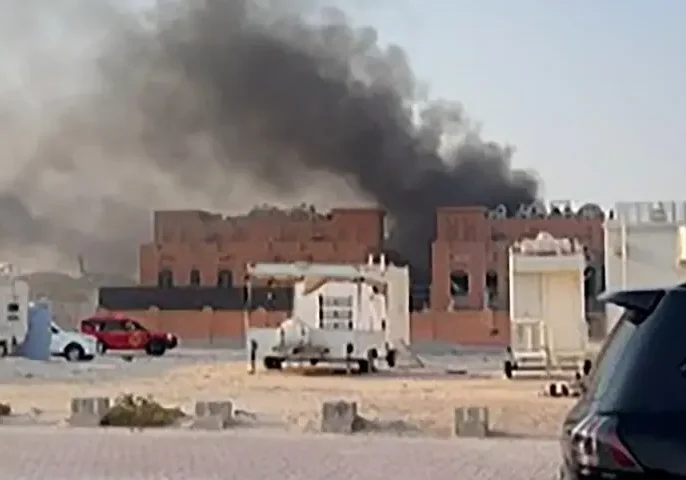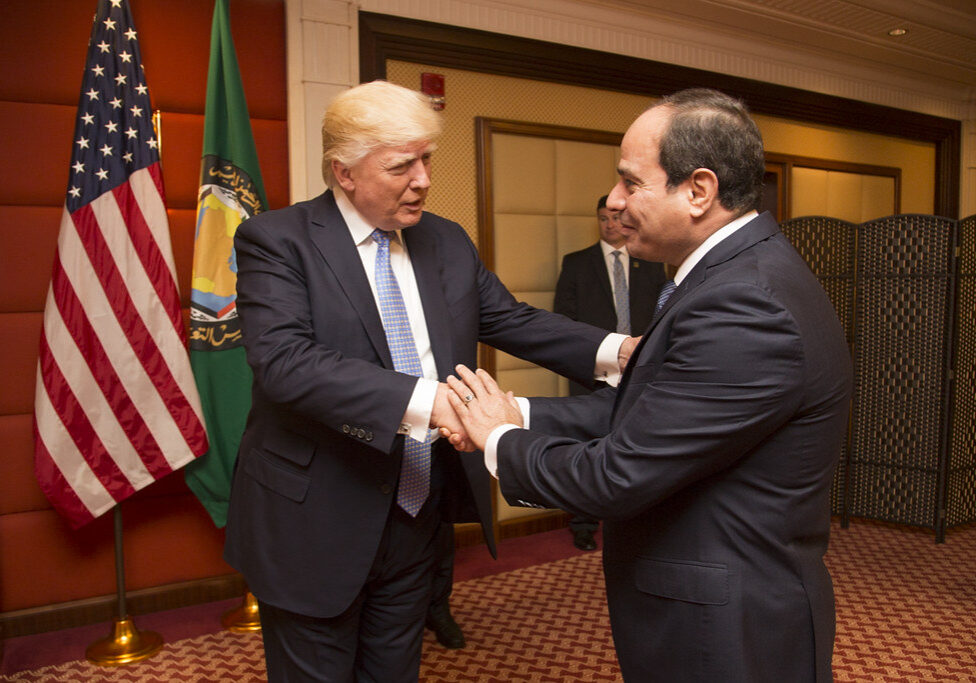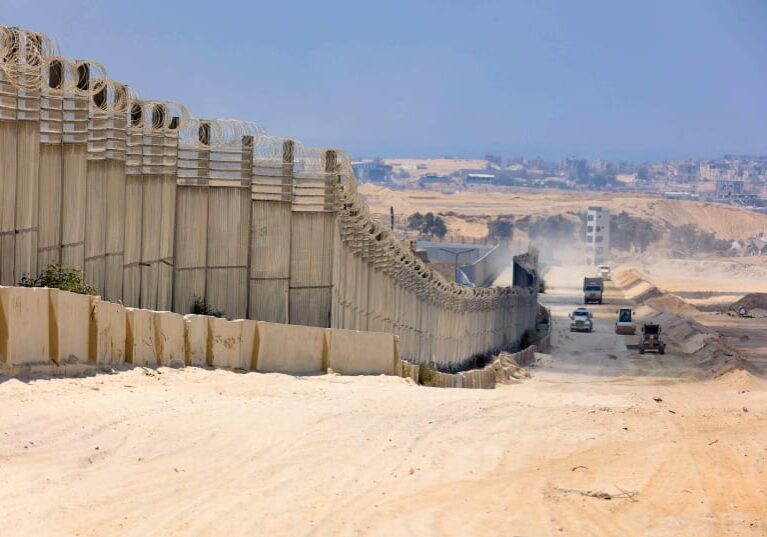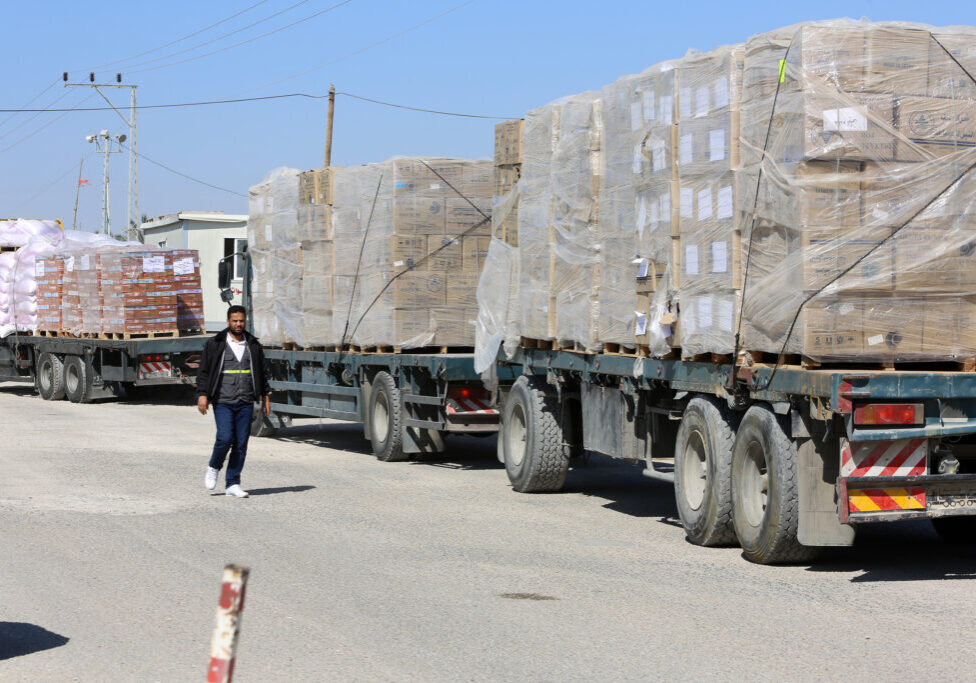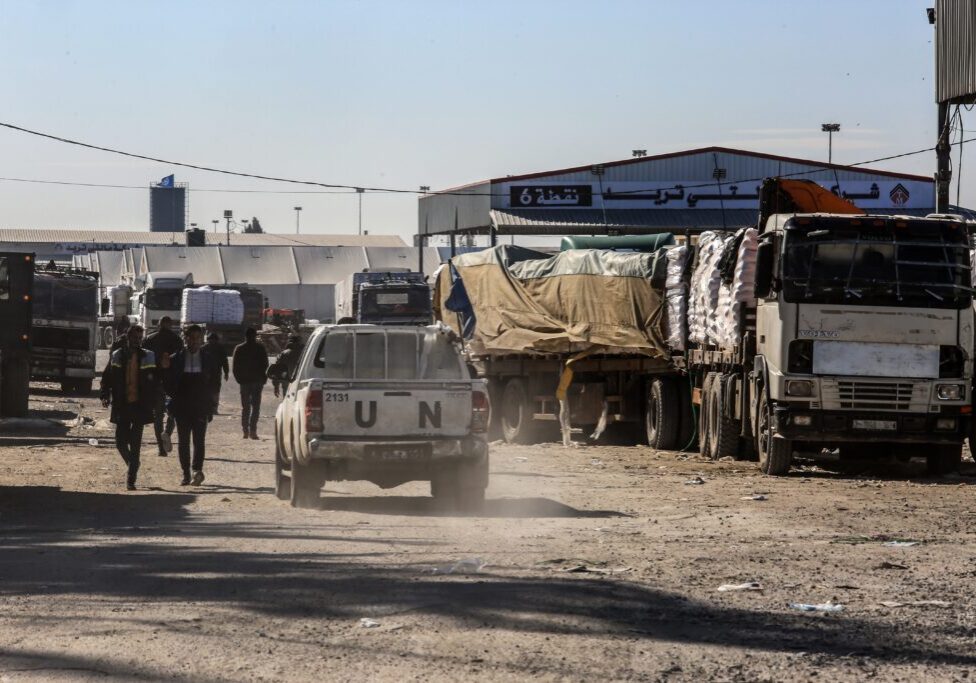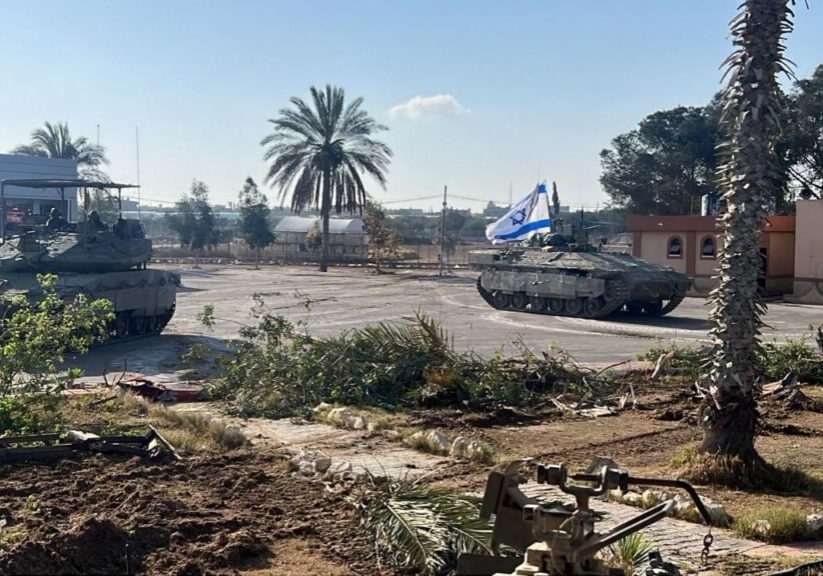Australia/Israel Review
Essay: Inside a War Cabinet
Jun 6, 2017 | Yaakov Lozowick
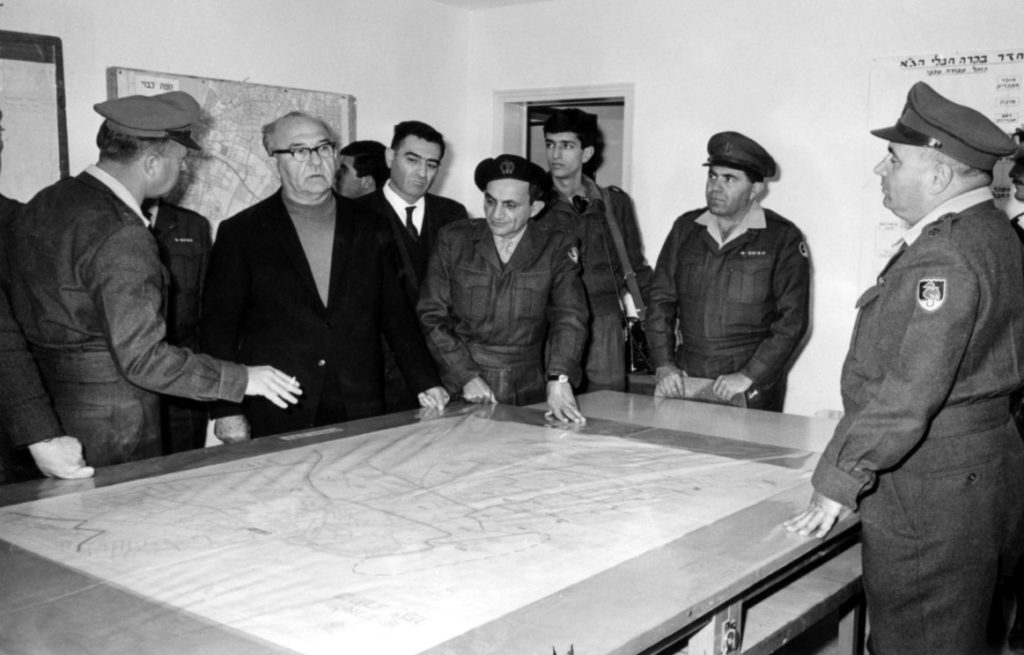
Secret transcripts from the Six Day War
Yaakov Lozowick
The Six-Day War was run by a committee. A highly classified committee, whose transcripts have never been seen for 50 years. Until now – read them at tinyurl.com/6daydocs.
Israel has no commander-in-chief. The military is subordinate to the cabinet, where each minister, prime minister included, has one vote.
Often the cabinet sets up a smaller committee called the security cabinet (SC), to which it delegates supervising and commanding the military. Facing exceptional decisions, the prime minister may declare that the entire cabinet is the SC. This ensures secrecy, because leaking information from the SC has serious penalties. Prime Minister Levi Eshkol often reminded his colleagues that the very fact that they had met was itself a state secret.
The security cabinet of 1967 appears in these never-published transcripts as a group of serious, professional and responsible decision-makers. While the ministers brought their worldviews to the table, they often didn’t vote on party lines, often did listen to one another, and generally managed to make decisions, albeit slowly and through compromises. These characteristics were not helpful in the maelstrom of the Six-Day War, when the cabinet receded in the face of its two most enigmatic members: Levi Eshkol, who can be read either as a weak figure or a master manipulator; and Moshe Dayan, who comes across as an arrogant but talented prima donna.
The SC met irregularly 36 times between January and July 1967. Three meetings took place in the final 24 hours of the war, followed by three meetings in two days about what to do with the new territories. There were five meetings in January, but only one in March. The ministers, being politicians, tended toward wordiness; the 935 pages of the transcripts reflect some 100 hours of talk.
The very point of their committee was to manage Israel’s military challenges. Yet none of the ministers saw the approaching war until it was almost upon them; not a single one of them foresaw its outcome.
Between January and mid-May 1967, the meetings focused on Syria.
Between May 15 and June 4, the SC strove to comprehend the significance of unfolding events in Egypt.
During the six days of June 5-10 it tried to remain in control of events, with only middling success.
In spite of fundamental differences of perspective, ideology and character, the ministers listened to each other and followed developments with minds open enough that outcomes of deliberations were not foretold.
There were two hawks: Yisrael Galili and Yigal Allon. The then-56-year-old Galili is probably the most powerful Israeli politician you’ve never heard of; indeed, few Israelis in 2017 remember him. A former leader of the Haganah, he had scant patience for restraint when faced with Syrian fire at Israeli farmers along the border:
I think that not to respond to tank shells is beyond what we can endure, especially as we’ve already tried it. We once didn’t respond, and that may have encouraged them to try again. If the logic of not responding is that it will create mutual calm along the border, we can save a lot of effort. Sadly, that message hasn’t proved compelling over the years… I don’t wish for any flare-ups on the northern border. Yet over the years when we’ve been slack, we’ve later been required to pay with blood. When we respond to fire with fire, we’ve gained control over fields, and we haven’t when we held back. (Jan. 3)
Allon, 49, had been the commander of the Palmach and a general. Like Galili, he was a member of Achdut Ha’avoda, the right-wing faction of the governing Alignment (Labor) party:
We must stop assuming the Syrians think the way we think. They interpret our actions differently than the way we’d like them to, and thus we put our people in dangerous situations… We stopped cultivating our own fields for a month or two or even more because Chief of Staff [of the United Nations Truce Supervision Organisation] Bull asked for time to try and reach an agreement with the Syrians. We gave him that; no one can say we didn’t. He failed. Today we allow Syrian shepherds to enter the demilitarised areas, tomorrow they’ll enter the non-demilitarised areas, and pretty soon we won’t be able to build on our own territory. The longer we don’t respond, the more insolent the Syrian wildcat will become. (Jan. 9)
Allon complained the SC was micro-managing the generals. To which Moshe Haim Shapira, 65, responded sharply:
Micromanaging the military is precisely what this group is for. The people here are supposed to be cool-headed, not trigger-happy. We’re precisely supposed to hold back.
Shapira is one of the surprises of the transcripts. The Minister of the Interior, he was the leader of the National Religious Party – which, within a few years (and after his death), was to become the political home and launching pad of the settlers’ movement. In 1967, he was one of the two whitest of doves in the SC.
Take the meeting of Jan. 12, at which the IDF, exasperated at the unrelenting attacks of the Syrians, requested permission to escalate its responses. Shapira would have none of it:
I understand we have a new proposal before us. We’re escalating. There are greater experts here than I, but so far we’ve been responding to fire with fire. They used tanks, we responded with tanks. We’ve said if they hit our villages we’d respond with tanks, but since our tanks aren’t effective against their artillery, we’ve got no choice but to use planes to protect the civilians…To change our policy and use planes [against Syrian military targets which aren’t shooting at villages], that might lead to war. I can’t accept that… I understand when the Chief of Staff tells how hard it is to live in a state of constant vigilance and high alert. Well, I say it’s better to be on high alert than at war.
Shapira also announced that the SC didn’t have the authority to escalate. For that, it had to be the full cabinet, and he would report to his party, and the decision ought to be presented to the Knesset. The second white dove, Health Minister Yisrael Barzilai, 52, of the left-wing Mapam party, jumped at the suggestion. We too need to talk to our party leaders, he said, effectively blocking the proposal.
The diversity of opinion within the SC over Syria was on clear display on April 11, 1967, four days after the downing of six enemy aircraft. Lt. Gen. Yitzhak Rabin, 45, the Chief of Staff and a frequent participant in the meetings, saw an opportunity to assert Israel’s sovereignty over 150 acres of land near Kibbutz Almagor, an area not cultivated since independence. It was soon clear that it wasn’t only the doves who were wary, it was also centrists such as Education Minister Zalman Aran, 68, Tourism Minister Moshe Kol, 56, and Minister of Religious Affairs Zerach Wahrhaftig, 61.
Perhaps surprised by the emerging resistance to what he had thought would be an easy sale, Levi Eshkol, 71, Prime Minister and Minister of Defence, uncharacteristically took a decisive position. Rejecting the position that because Israel had so far voluntarily refrained from cultivating the section for many years and could continue refraining, he fumed:
We were in exile 2,000 years, and then there was struggle and a war. I can’t forget the outcry when we had to relinquish 2.5 dunam (less than an acre) near Jerusalem. How will we justify relinquishing 600 dunam here? And why not refrain from insisting on cultivating all the other fields where the Syrians shoot at us?… If not now, when? If we don’t act now, we’ll regret it for generations.
Eshkol’s passion failed to convince. Fearing they were on the cusp of a major decision, some of the ministers demanded the discussion be moved to the full cabinet. In an evening session, the full cabinet was just as sceptical. Zalman Aran of Eshkol’s Mapai faction summed up his hesitation:
I fear we’re at a crossroads. Since this morning we’ve seen that the Syrians are not in such a state of shock that they’ve stopped shooting at our farmers. Perhaps they’re planning something with the Egyptians; we need to take that into account. If we decide to use the air force to defend the cultivation of those 600 dunams, we need to be prepared for a broader campaign… I need more time to think about this, and request that there be no decision this evening.
Larger events were soon to overtake two decades of violence on the Syrian border. On May 14, Israel’s 19th Independence Day, Egypt began loudly and publicly to move troops through Cairo and into Sinai.
On the 16th, the full cabinet convened for its weekly meeting, and Eshkol reported on the developments. Asked if the IDF was taking precautionary measures he answered laconically that it was, and moved on to the next items on the agenda: a report about an official visit to Poland by a junior minister, and proposals about how to streamline the civil service. The SC first discussed the matter the next day, and while the descriptions of the military preparations were better than in the full cabinet, on this third day of the crisis, no one seems to have seen a war coming. The Egyptians were assumed to be putting on a show.
The tone changed on May 21. Egyptian President Gamal Nasser had asked UN Secretary-General U-Thant to move the UN troops in Sinai (UNEF), and U-Thant, astonishingly, removed them completely. The main achievement of Israel’s 1956 Sinai campaign had vanished overnight. Most of the meeting was dedicated to updates from Rabin, Foreign Minister Abba Eban, 52, and Eshkol. Given the gravity of the situation, it was decided to discuss the implications in the full cabinet sitting as the SC.
Yet even as the discussion was being postponed, both Galili the hawk and Shapira the dove said they understood Israel to be facing war. Shapira was resigned, saying the Egyptian actions wouldn’t be reversible without war. Galili’s position was sharper: War had already started. What he wanted to know was how the air force could assure that it would knock out Egypt’s air force before it was itself attacked. Three weeks before the historic attack on Egypt’s air force, the key Israeli move of the Six-Day War was already on the table.
The second SC meeting on May 21 included all the ministers, and almost all of them gave short speeches. Eshkol summed up with weary resignation: We’re preparing. We can’t acquire additional weapons, not now. We’re being careful on the borders. We’re in touch with the Americans. We’ve called up some of the reserves but not all. We’ll hope for the best. The discussion ended with a resolution that the IAF would respond with full force to any attack on its bases – as if two cabinet meetings had been necessary for that.
By the meeting on May 23, Egypt had blocked the Tiran Straits, stopping Israeli trade with Asia. The ministers all agreed this was likely to lead to war, but most of them, including Rabin, who, as a general, had no vote, accepted the importance of convincing the Americans that Israel wasn’t rushing to war. Maj. Gen. Ezer Weitzman, 43, head of operations and previously commander of the IAF, explained that while the opportunity for strategic surprise had passed, the air force was still confident it could achieve tactical surprise when needed. As there was an American request to allow 48 hours for diplomacy, the ministers decided to refrain from military action.
But by May 26, the members of the SC felt trapped. The Egyptians were digging in and reinforcing. Rabin reported evidence of their intent to attack. Jordan was about to join Egypt. Most of the IDF reserves had been mobilised, and the economy could not afford them to stay mobilised for long. There was no realistic prospect of Israel acquiring additional weapons.
Yet everyone understood they had no choice but to wait for Abba Eban to return with his reports from Europe and the US. So they discussed the possibility of broadening the coalition by creating a national unity government. Expecting a long and bloody war, they sought political consensus.
On Saturday night, May 27, the entire cabinet sitting as the SC deliberated almost until dawn. Abba Eban arrived after 10 pm from the airport, gave his report, left to report to the Knesset Committee of Foreign and Security Affairs, then returned to find the ministers still agonising. Key world leaders were all demanding Israel not attack; the ministers all knew war was inevitable but couldn’t agree on a course of action. If we attack first, what will the international cost be? If we’re hit first, how many lives will we pay with? (Many thousands, they expected). If we wait, what do we gain? At what cost? If we don’t wait – at what cost?
June 1 saw two meetings: one of the SC, the second of the full cabinet. With the establishment of the national unity government, Menachem Begin and Moshe Dayan joined this meeting as MKs because they had not yet been sworn in as ministers. At half past midnight on June 2, Eshkol sent everyone to bed: “We’re all exhausted. We’ve been deliberating all day. Tomorrow morning I’ll introduce you all to the general staff. You need to hear what the generals have to say.”
The morning of June 2, 1967, saw one of the most unusual meetings in the annals of the security cabinet: The entire cabinet convened in the IDF headquarters to meet the entire general staff.
Aharon Yariv, 46, head of intelligence, began: We see no military advantages in further waiting, and considerable danger. The Arab armies are continuing to dig in, prepare, and acquire further arms. We have no potential for re-arming.
Rabin: The coordination among the Arab armies is growing. They are emboldened by our inaction.
Mordechai Hod, 41, head of the air force: We will do our job under any conditions, but each 24-hour-delay raises the potential price we may have to pay.
Yishayahu Gavish, 42, commander of the southern front: Here’s a map of Egyptian forces on May 22. Here’s what they had last week. And here’s what they have today. Additional [Egyptian] forces are on their way from Yemen. They get stronger every day.
Division Cmdr. Ariel Sharon, 39: We’re ready, and we’ll destroy the Egyptian army. There will be casualties, but we must do the job. Begging other nations to save us won’t work. Waiting for hypothetical additional arms isn’t necessary. We will do the job.
Quartermaster Matti Peled, 43: What are we waiting for? Tell us: What are we waiting for?
And still, the cabinet hesitated. There was another inconclusive meeting on June 4. Then, in the afternoon of June 4, the full cabinet convened as the security cabinet for what was to be the fateful meeting. Gen. Yariv described the further deterioration of the situation. Jordan’s army had been put under Egyptian command. Iraqi forces moving into Jordan. Ever more Egyptian forces in Sinai, with some commando units seemingly preparing to attack, and so on. Abba Eban described American efforts to break the naval blockade, but noted they would require a week or more to be effective and were irrelevant to the full scope of Arab military preparations.
One after another, each of the ministers had his say. All agreed war was inevitable. Most tried to justify the waiting period, hoping Israel had gained credibility in the eyes of the world. Haim Gvati (66, Mapai) gently mocked his hesitant colleagues: “I’m surprised by those who think the great powers will ever, ever say to us that the time has come and we can attack our enemies. They never will.”
At the end, Shapira and Barzilai’s common front was broken. Barzilai and fellow Mapam minister Mordechai Bentov, 67, still felt Israel should inform the great powers that Israel’s patience was at its very end; Shapira had joined all the others in accepting that time had run out.
The cabinet directed the IDF to break the Arab choke ring and authorised Eshkol and Dayan to determine the precise details.
Over the next six days of war, the SC met seven times. Yet it was no longer really in control of events. Back in February it had debated the precise calibre of the weapons used to respond to Syrian fire; now it was mostly relegated to the back seat.
The first meeting of the war was in the evening of June 6, more than 30 hours into the campaign. The first 90 minutes of the meeting were simply updates. The Egyptian army was collapsing in Sinai, Gaza had been mostly conquered, chunks of the West Bank had been taken, and the areas to the north and south of the Old City were secured by the IDF.
None of this had been discussed, much less authorised, by the entity that legally commands the military.
The meeting marked the pinnacle of euphoria. Less than two days after fearfully authorising a military campaign expected to cause thousands of deaths, the ministers could be forgiven a large sigh of relief. Eshkol, normally circumspect and careful, wondered if it might be possible to solve Israel’s water problems by taking southern Lebanon till the Litani River. Dayan, flamboyant and erratic, boasted that Israel could reach Cairo if anyone was interested, and would soon take Sharm el-Sheikh and hold it for 300 years. He also told the ministers they needed to talk less as he didn’t have time for a long meeting. When Allon and Begin insisted that the Old City be taken immediately before the United Nations might intervene, Dayan explained he didn’t want such a decision.
Perhaps the single most important decision in millennia – that the Jews should rule in Jerusalem – was probably made early on June 7 by Moshe Dayan, not by Israel’s government. Because the IDF was already advancing deep into the West Bank, the government simply okayed an advance that had already happened in the heat of battle.
The final three days of the war saw an intense flurry of meetings. Jordan had accepted the cease-fire, and the war on that front was over. Egypt and Syria hadn’t yet, and the major effort was to consolidate IDF control over the Sinai and down to Sharm el-Sheikh.
The decision to reach the Suez Canal seems to have been made by Dayan, who spent the first few days explaining why this would be a poor idea, then told the ministers it had already happened.
Most of the deliberations were focused on Syria, which had been shelling Israeli villages all week but was still on the sidelines of the territorial war. At first the IDF didn’t have the resources for what seemed likely to be a costly effort parallel to the main theatre in Sinai and the unplanned one on the West Bank. As the fighting progressed, the cabinet feared a confrontation with the Soviet Union, which it perceived to be protecting Syria more than Egypt. Yet public pressure was mounting.
On June 8, Eshkol brought in three farmers from villages under Syrian artillery fire who beseeched the ministers to end their local hell.
The ministers, back in their usual cautious mode, were mostly unconvinced. They were willing to see IDF plans for attacking the Syrians, but no more.
The next morning (June 9), Dayan told the ministers he and Eshkol had given the green light for an attack; in the transcript, Eshkol sounds evasive. Shapira was furious: This is not at all what we agreed upon. Everyone else was uncomfortable but unwilling to halt the troops in battle.
At the very end of the meeting, it transpired that the units hadn’t actually entered Syrian territory – yet – but were poised to do so. But this passed without comment. It was Friday morning.
That evening only five ministers made it to the meeting in Tel Aviv. Because the Syrian artillery was still firing, they hoped the IDF units would reach them before the cease-fire. They did say the IDF shouldn’t launch a second attack from the southern Golan, and they recognised there were only hours left to achieve all goals.
Saturday night (June 10) there was another meeting. The IDF had attacked from the south. The Syrian army collapsed, said Dayan, and we had to take advantage of this. Eshkol explained, rather lamely, that “Dayan told me” but he hadn’t stopped the advance because he was in favour of it. During the meeting, word arrived that the two IDF columns had met in the centre of the Golan. The ministers stood for a moment of silence in honour of the fallen, then drank “l’chaim” (to life).
Yaacov Lozowick is Israel’s State Archivist. A historian and writer, he was previously the archives director at Yad Vashem. This article is reprinted from Tablet Magazine, at tabletmag.com, the online magazine of Jewish news, ideas, and culture. © Tablet Magazine, reprinted by permission, all rights reserved.
Tags: Egypt

